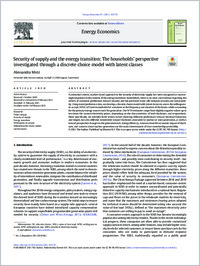Security of supply and the energy transition : the households' perspective investigated through a discrete choice model with latent classes
- Motz, Alessandra Facoltà di scienze economiche, Università della Svizzera italiana, Svizzera
-
24.02.2021
Published in:
- Energy economics. - 2021, vol. 97, no. May, p. 16 p
Power outage
Security of supply
Energy transition
Willingness-to-accept
Hybrid discrete choice model
Latent classes
English
A consumer-centric, market-based approach to the security of electricity supply has been recognized as increasingly important in the context of the energy transition. Nonetheless, there is no clear-cut evidence regarding the drivers of consumer preferences toward security and the perceived trade-offs between security and sustainability. Using stated preference data, we develop a discrete choice model with latent classes to assess the willingness-to-accept (WTA) of Swiss households for variations in the frequency and duration of blackouts, while accounting for the primary energy sources used for generation. Our WTA estimates range from slightly negative values up to ten times the current electricity prices, depending on the characteristics of both blackouts, and respondents. More specifically, we identify three latent classes showing different preferences toward blackout frequency and length, but also different sensitivities toward blackouts associated to nuclear or solar generation, as well as toward prospective changes in the generation mix. Energy illiteracy, concern about the economic impact of blackouts, and concern about nuclear generation are the main determinants of class membership probability.
- Language
-
- English
- Classification
- Economics
- License
- Open access status
- hybrid
- Identifiers
-
- RERO DOC 330553
- DOI 10.1016/j.eneco.2021.105179
- ARK ark:/12658/srd1319317
- Persistent URL
- https://n2t.net/ark:/12658/srd1319317
Statistics
Document views: 179
File downloads:
- Fulltext: 354
